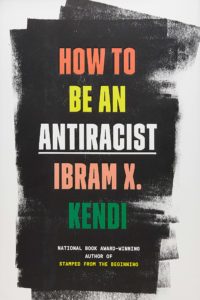
Each year, the Foundation’s Member Engagement Committee selects a book for all members to read. This year, in continued alignment with our grantmaking criteria of increasing equity and reducing disparities, they invite you to read How to Be an Antiracist by Ibram X. Kendi. In this New York Times bestseller, Kendi takes readers through a widening circle of antiracist ideas – from the most basic concepts to visionary possibilities – that will help readers see all forms of racism clearly, understand their poisonous consequences, and work to oppose them in our systems and in ourselves.
As part of the selection process for the Spring Book Discussion, the Member Engagement Committee reads a short list of related book titles and shares their thoughts. We asked the Member Engagement Committee to share their thoughts on the books they read which were not selected for this spring’s Book Discussion:
Decolonizing Wealth: Indigenous Wisdom to Heal Divides and Restore Balance, Edgar Villanueva
“Decolonizing Wealth is an engaging analysis of the dysfunctional colonial dynamics at play in philanthropy. Villanueva describes how the philanthropic industry has evolved to mirror colonial structures and reproduce hierarchy, ultimately doing more harm than good. Villanueva draws from the traditions of the Native way (Seven Steps for Healing) to prescribe the medicine for restoring balance and healing divides. It is an easy and quick read, but full of thought-provoking reflections that challenge the philanthropic world.” – Jean Kelly
“Edgar Villanueva details how philanthropy has evolved to reflect colonial structure in his book, Decolonizing Wealth: Indigenous Wisdom to Heal Divides and Restore Balance. He shares how this is doing more harm than good in instituting wealthy white men’s agendas and savior complexes. He offers seven steps to healing and recalibrating within philanthropy. I appreciated his thoughtful analysis, which got me to question some long held beliefs. He speaks often in Seattle.” – Denise Allan
Mothers of Massive Resistance: White Women and the Politics of White Supremacy, Elizabeth Gillespie McRae
“Mothers of Massive Resistance: White Women and the Politics of White Supremacy by Elizabeth Gillespie McRae examines the role of white women in the United States to maintain segregation and white supremacy in both law and practice from the 1920s to the 1970s. It includes examples of specific women’s work in censoring textbooks, identifying and policing the race of their neighbors, as political advocates and journalists, and as anti-busing protesters. I found the content to be an interesting new look at the history of segregation. The book is a bit of a dense read, but I do recommend it if you are interested in an expanded your knowledge of this history outside of what is typically included.” – Melinda Herrin
The New Jim Crow: Mass Incarceration in the Age of Colorblindness, Michelle Alexander
“The New Jim Crow: Mass Incarceration in the Age of Colorblindness is written by Michelle Alexander, a female civil rights litigator. The discussion of targeted imprisonment and social policy through mass incarceration under the guise of “The War on Drugs” is the thesis of the book. The writing by this legal scholar makes a powerful case for the need for reform of our legal system and demonstrates the extreme bias in sentencing of black males for drug related charges. Ms. Alexander shows the striking differences in statistics for imprisonment for use of crack cocaine, a cheaper form found in higher use in poor neighborhoods of color, versus powder cocaine, which was and is more often used in white suburbs. This creation of social control through imprisonment started in the early 1980’s under the Reagan administration. Ms. Alexander states that the US prison population has exploded from 300,000 to now more than 2 million people, largely due to convictions for drug selling and use. She contends that this has led to the creation of an “undercaste” of black men in our country.
The book was published in 2012, before the rise of the “Black Lives Matter” movement and prior to some of the most striking exposure of police violence and killing of innocent people. The book is definitely worth a read, but so much has happened in the past 7 years that perhaps it should only be one recommendation in a selection of other more recent books.” – Amy Corey
Dying of Whiteness: How the Politics of Racial Resentment is Killing America’s Heartland, Jonathan Metzl
“Dying of Whiteness is very well researched and you can be excused for not paying attention to all the studies and percentages. The perspective is important and the conclusions are compelling. According to goodreads:
‘Physician Jonathan M. Metzl’s quest to understand the health implications of “backlash governance” leads him across America’s heartland. Interviewing a range of everyday Americans, he examines how racial resentment has fueled pro-gun laws in Missouri, resistance to the Affordable Care Act in Tennessee, and cuts to schools and social services in Kansas. And he shows these policies’ costs: increasing deaths by gun suicide, falling life expectancies, and rising dropout rates.’” – Sharon Hammel
The Color of Law: A Forgotten History of How Our Government Segregated America, Richard Rothstein
“[The Color of Law] is so eye-opening in terms of state and local housing discrimination/restrictions – including in this area – that existed for so long even after the Fair Housing Act of 1968 was passed at the federal level… [the book] spans laws, practices and policies of segregation and zoning from the 20’s to current day.” – Marcia Bailey
For folks who are interested in reading The Color of Law, we also encourage you to check out 2017 Arts & Culture Merit Award winner The Wing Luke Museum’s current exhibit on redlining, open until February 23, 2020.
Please stay tuned for the date and registration information for the book discussion in the new year. Remember you can support WA Women’s Foundation by purchasing a copy of How to Be an Antiracist or any of the shortlisted books at smile.amazon.com.